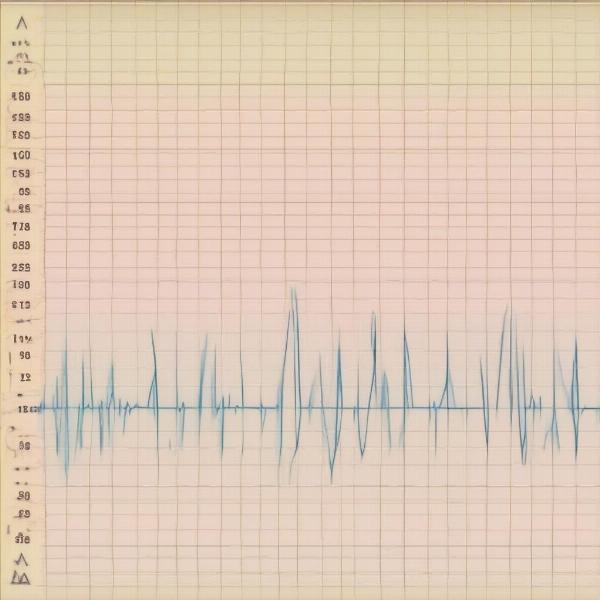Ventricular tachycardia (VT) in dogs is a serious heart condition characterized by a rapid, abnormal heart rhythm originating in the ventricles. This condition can compromise blood flow and lead to serious complications if left untreated. Understanding the causes, symptoms, diagnosis, and treatment of VT is crucial for any dog owner.
What is Ventricular Tachycardia in Dogs?
Ventricular tachycardia occurs when the electrical signals that control the heart’s rhythm malfunction, causing the ventricles to beat too quickly. This rapid heart rate can prevent the heart from effectively pumping blood to the rest of the body, leading to a range of symptoms, from mild to life-threatening. VT can occur in dogs of any age or breed, but certain breeds may be predisposed.
 Dog ECG showing Ventricular Tachycardia
Dog ECG showing Ventricular Tachycardia
Causes of Ventricular Tachycardia in Dogs
Several factors can contribute to the development of VT in dogs. These include underlying heart diseases such as dilated cardiomyopathy (DCM) and mitral valve disease, as well as electrolyte imbalances, certain medications, and even genetic predispositions. Identifying the underlying cause is crucial for effective treatment.
Recognizing the Symptoms of VT
The symptoms of ventricular tachycardia in dogs can vary widely depending on the severity and duration of the rapid heart rate. Some dogs may exhibit no noticeable symptoms at all, while others may experience weakness, collapse, fainting episodes (syncope), shortness of breath, and even sudden death. If you notice any of these symptoms in your dog, it’s essential to seek immediate veterinary attention.
Diagnosing Ventricular Tachycardia
Veterinarians use several diagnostic tools to confirm a diagnosis of VT, including an electrocardiogram (ECG), which measures the heart’s electrical activity, and echocardiography, which uses ultrasound to visualize the heart’s structure and function. Blood tests may also be performed to assess electrolyte levels and rule out other potential causes.
Treatment Options for VT
Treatment for ventricular tachycardia in dogs depends on the underlying cause and the severity of the condition. Medications such as antiarrhythmic drugs can help regulate the heart rate, while other treatments may address underlying heart conditions. In some cases, more invasive procedures like cardiac catheter ablation or the implantation of a pacemaker may be necessary.
Living with a Dog with Ventricular Tachycardia
Managing a dog with VT requires ongoing veterinary care and close monitoring. Regular checkups, medication administration, and lifestyle adjustments may be necessary to maintain the dog’s quality of life.
Conclusion
Ventricular tachycardia in dogs is a serious heart condition that requires prompt diagnosis and treatment. By understanding the causes, symptoms, and treatment options, you can be better prepared to care for your dog and ensure their well-being. Early detection and intervention can significantly improve the prognosis for dogs with VT.
FAQ
- What is the most common cause of VT in dogs? Dilated cardiomyopathy (DCM) is often associated with VT.
- Is VT always fatal in dogs? No, with proper treatment and management, many dogs with VT can live long and fulfilling lives.
- What should I do if my dog collapses suddenly? Seek immediate veterinary attention, as this could be a sign of a life-threatening condition like VT.
- Can diet affect VT in dogs? A balanced and appropriate diet is crucial for overall heart health and can support the management of VT.
- Are certain breeds more prone to VT? Yes, some breeds, like Doberman Pinschers and Boxers, have a higher predisposition to certain heart conditions that can lead to VT.
- Can stress trigger VT in dogs? While stress isn’t a direct cause, it can exacerbate underlying heart conditions and potentially trigger VT episodes.
- How can I monitor my dog for signs of VT at home? Observe your dog for changes in breathing, energy levels, and any signs of discomfort. Consult your vet about monitoring techniques.
ILM Dog is your trusted resource for expert advice on dog care and wellbeing. We offer a wealth of information on dog breeds, health, training, nutrition, grooming, and much more. Whether you’re a new dog owner or a seasoned expert, ILM Dog is here to help you provide the best possible care for your canine companion. For expert guidance and personalized support, contact us at [email protected] or call us at +44 20-3965-8624. Visit ILM Dog for more information.